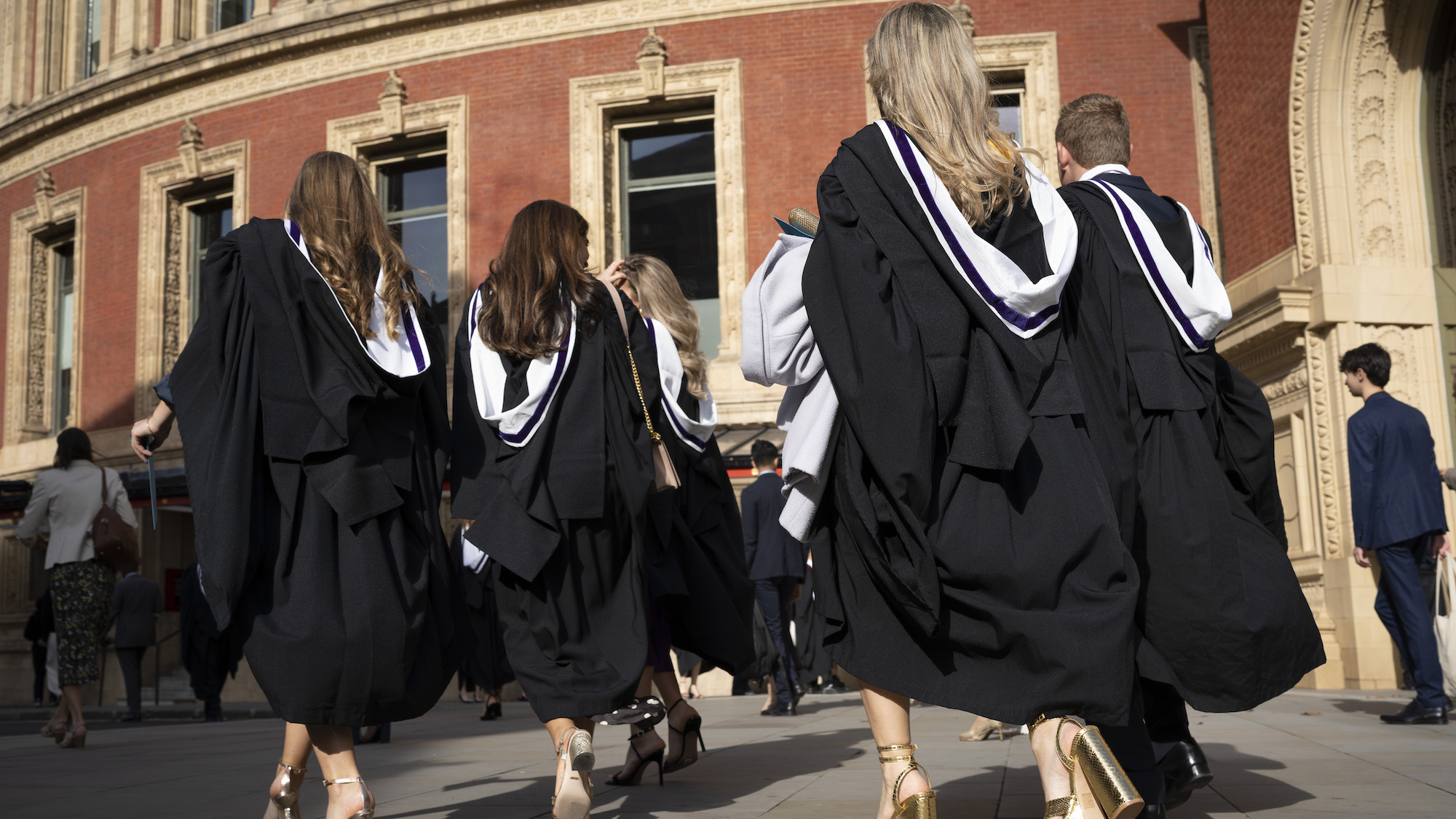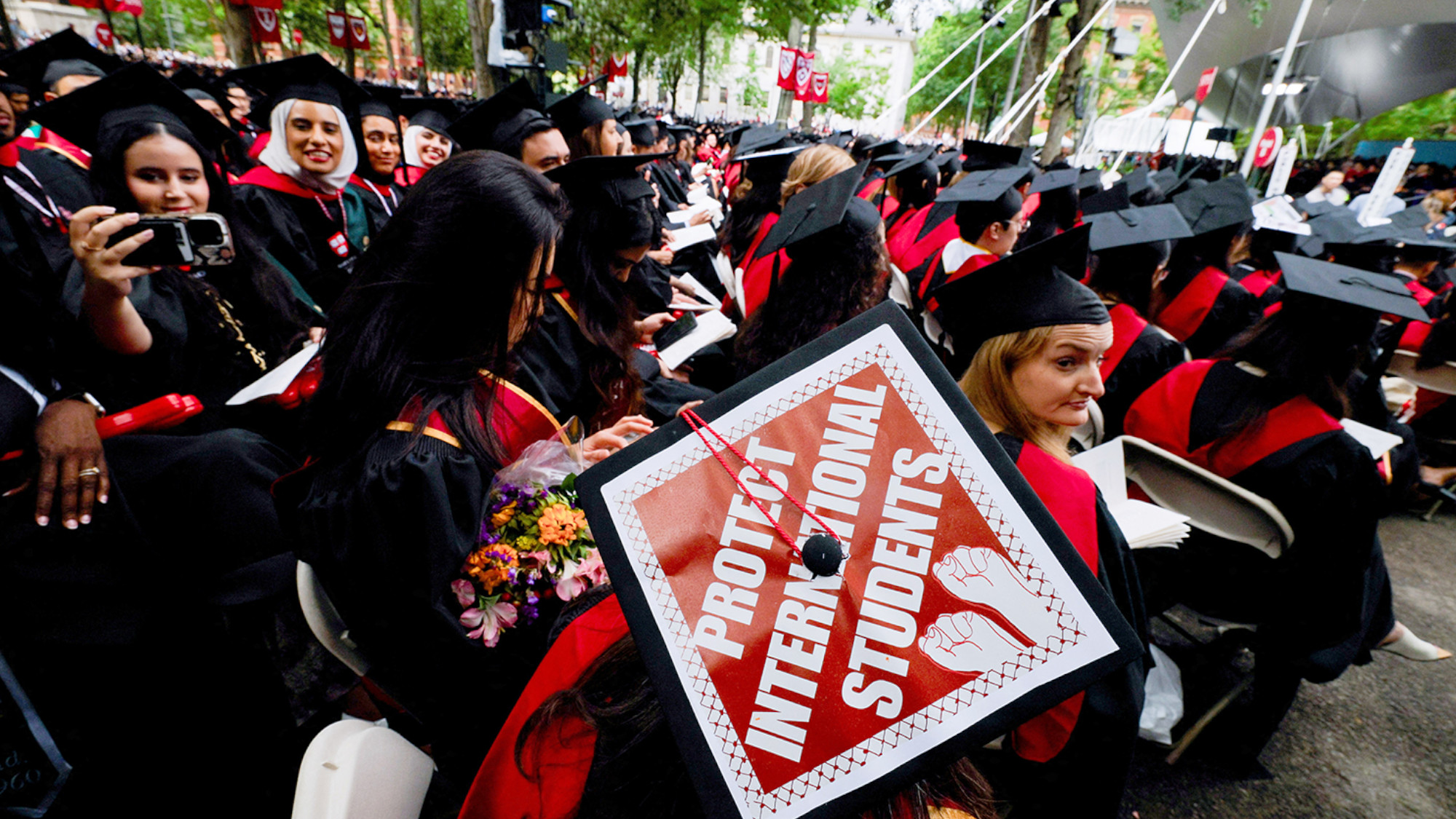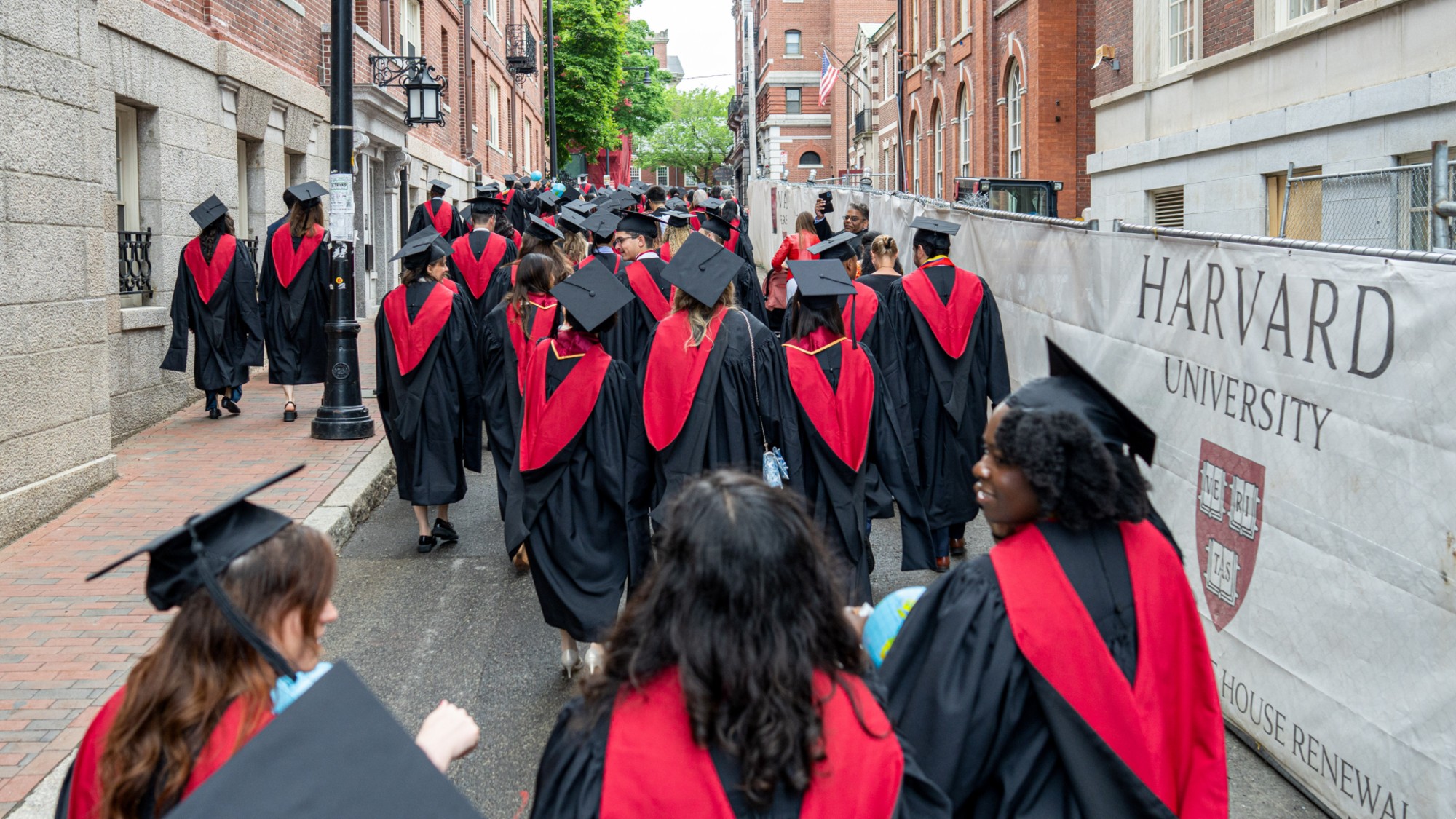Why the UK's universities are in financial crisis
Spiralling costs and fewer international students are leaving universities facing an unprecedented funding crisis

A free daily email with the biggest news stories of the day – and the best features from TheWeek.com
You are now subscribed
Your newsletter sign-up was successful
The government's immigration crackdown could increase the financial pressure on Britain's beleaguered higher education institutions, leaders in the sector have warned.
University bosses have said that government plans for reform of the higher education sector (details will not be made public until later this summer) raised "significant financial concerns", said The Independent.
Earlier this year, Labour MP Helen Hayes, chair of the House of Commons Education Committee, warned that freezes to tuition fee levels, a decline in international students and spiralling costs have led to a "perfect storm bearing down on institutions".
The Week
Escape your echo chamber. Get the facts behind the news, plus analysis from multiple perspectives.

Sign up for The Week's Free Newsletters
From our morning news briefing to a weekly Good News Newsletter, get the best of The Week delivered directly to your inbox.
From our morning news briefing to a weekly Good News Newsletter, get the best of The Week delivered directly to your inbox.
How bad is the problem?
There have been warnings for years of a looming crisis in university funding.
In 2023, the Sunak-led Tory government introduced restrictions on overseas students such as a ban on bringing relatives, which, said PoliticsHome, has "resulted in many universities reporting a drop in applications from abroad".
In the last academic year, a third of the UK's 150 or so higher education institutions had only enough funds to last for 100 days, with an increasing number facing "a material risk of closure" unless they dramatically cut costs or merge over the next few years.
It was against this backdrop that Education Secretary Bridget Phillipson announced an increase in tuition fees in England for the first time in eight years – from £9,250 per year, to £9,535 – in order to "bring stability to university finances".
A free daily email with the biggest news stories of the day – and the best features from TheWeek.com
Meanwhile, an Immigration White Paper, published in May by the Labour government, set out plans to introduce a levy on international student income and reduce the time that graduates can remain in the UK after completing their studies before landing a skilled job from two years to 18 months.
University leaders from the Russell Group warned that these proposals could make the UK "less competitive internationally", further hitting their finances. The latest annual health check of the sector by the Office for Students (OfS) found that 43% of universities are facing budget deficits.
How are universities funded?
The total income of UK higher education providers in 2022/23 was about £50 billion. Of this, some 52% came from tuition fees (43% of which were paid by international students); 14% came from research grants (from government bodies and charities); and 12% came from direct government funding. Other sources of income include donations and endowments.
Since higher education is devolved, the UK’s different administrations have different funding models. In Scotland, home students’ tuition fees are paid directly by the government, meaning Scottish student numbers are capped, unlike in England; all Welsh undergraduates receive a minimum maintenance grant of £1,000 to help with living costs; and in Northern Ireland, fees are capped at £4,750.
Why are universities so cash-strapped?
The current financial challenges facing UK universities are broadly because of "funding reforms implemented in 2012 and the decreasing government support since then", said LSE Blogs.
Tuition fees had been frozen at £9,250 since 2017; if they had risen in line with inflation since 2012, they would have reached nearly £15,000 by now. This has caused a sharp real-terms drop in income; the last time universities’ income was this low was when tuition fees were first introduced, in 1998.
At the same time, they have had to contend with inflation-driven rises in operational costs, staff salaries and pension payments. As a result, before the tuition fee hike was announced, they were making a loss of £2,500 on each domestic student, according to analysis by the Financial Times – so the sector has become dependent on fees from international students.
Essentially, said Richard Murphy on his TaxResearch blog, international students have been "massively subsidising" university losses due to the government "not allowing student tuition fees to go up", but there are now plans to limit them.
What issues does that raise?
The number of international students enrolling at UK universities has, over the past 20 years, risen sharply: in 2003, there were about 300,000 students from outside the UK on their books; by 2022/23, there were 758,855 – 26% of the student body. They can be charged much higher fees than UK students – up to £26,000 a year in tuition fees for undergraduate courses – and contributed £11.8 billion in fees in 2022/23.
However, the issue is politically contentious. Universities argue that foreign students prop them up, and that it’s good to attract talent from around the world. Critics complain that education is used as a back door to economic migration; at least a third of foreign students settle in Britain, notably those from India, China and Nigeria. Rules designed to reduce this – banning most postgraduate students from bringing family members to live with them, for instance – have meant that student visa applications dropped by 16% last year. And this has greatly affected university finances.
What effect is all this having?
For years, universities have been asked to do more with less. And with foreign students no longer fully plugging the gap, more than 90 UK universities have announced staff redundancies, course closures and other forms of restructuring. Others may be forced into mergers, or axing some degrees. Some may go bankrupt, and either have to be bailed out financially by the government, or close down.
Among academics, morale is reportedly at an all-time low. The prospect of further job losses follows years of falling pay, heavier workloads, often precarious working conditions and pension reductions – which have led to waves of strikes. There is likely to be further industrial action as redundancies and restructurings are announced.
It is not just job losses that are a concern, said Murphy – students are "definitely suffering" too, as they will have less choice and worse staff teaching ratios "with no reduction of fees as a consequence".
Won’t the fee hike help?
Not really. The Institute for Fiscal Studies calculates that the hike will raise £390 million a year for universities; but changes to employers' National Insurance announced in last autumn's Budget will likely cost them £372 million a year, leaving a net gain of just £18 million. Besides, it will only start in the 2025/26 academic year. It will, though, add to the debt loaded onto students in England. The government has stated that "longer-term funding plans for the higher education sector will be set out in due course", but that probably means waiting until public finances are stabilised.
What will the government do?
It could increase tuition fees further or link them to inflation. It could increase grants to universities through more taxation. Inflation-linked fees and grant increases are essential, said Philip Augar in the Financial Times. Augar, who chaired a review of post-18 education for the Theresa May Tory government in 2018/19 said universities would have to be more "upfront about course employment outcomes" if students are paying more.
The government could also allow in more overseas fee-paying students or exclude international students from immigration statistics, "which is in line with the practice in the rest of Europe", said LSE. Or it could do some mixture of the above. The alternative is allowing higher education – one of Britain's world-leading sectors – to get poorer and smaller. Some would argue that we have too many universities. In 2006, 24.7% of UK 18-year-olds went to university; by 2024, that figure had risen to 36.4%. David Behan, chair of OfS, has suggested that the "golden age of higher education" is probably over, and that universities are likely to move towards far shorter courses that allow students to work and study simultaneously.
Some less illustrious universities could probably fail without serious repercussions. But many are anchor institutions in their towns and cities, often among the largest employers and contributors to the local economy. Any government, particularly a Labour one, would be keen to avoid such closures.
This means that, despite the uncertainty, it is unlikely any institution will simply be allowed to go under, said the Financial Times: "just like the banks – universities are too big to fail".
-
 Political cartoons for February 12
Political cartoons for February 12Cartoons Thursday's political cartoons include a Pam Bondi performance, Ghislaine Maxwell on tour, and ICE detention facilities
-
 Arcadia: Tom Stoppard’s ‘masterpiece’ makes a ‘triumphant’ return
Arcadia: Tom Stoppard’s ‘masterpiece’ makes a ‘triumphant’ returnThe Week Recommends Carrie Cracknell’s revival at the Old Vic ‘grips like a thriller’
-
 My Father’s Shadow: a ‘magically nimble’ film
My Father’s Shadow: a ‘magically nimble’ filmThe Week Recommends Akinola Davies Jr’s touching and ‘tender’ tale of two brothers in 1990s Nigeria
-
 American universities are losing ground to their foreign counterparts
American universities are losing ground to their foreign counterpartsThe Explainer While Harvard is still near the top, other colleges have slipped
-
 Education: More Americans say college isn’t worth it
Education: More Americans say college isn’t worth itfeature College is costly and job prospects are vanishing
-
 School phone bans: Why they're spreading
School phone bans: Why they're spreadingFeature 17 states are imposing all-day phone bans in schools
-
 Schools: The return of a dreaded fitness test
Schools: The return of a dreaded fitness testFeature Donald Trump is bringing the Presidential Fitness Test back to classrooms nationwide
-
 Columbia: A justified surrender to Trump?
Columbia: A justified surrender to Trump?Feature Columbia agrees to a $221M settlement and new restrictions to restore federal funding
-
 Education: America First vs. foreign students
Education: America First vs. foreign studentsFeature Trump's war on Harvard escalates as he blocks foreign students from enrolling at the university
-
 Where will international students go if not the US?
Where will international students go if not the US?Talking Points China, Canada and the UK are ready to educate the world
-
 Colleges are canceling affinity graduations amid DEI attacks but students are pressing on
Colleges are canceling affinity graduations amid DEI attacks but students are pressing onIn the Spotlight The commencement at Harvard University was in the news, but other colleges are also taking action